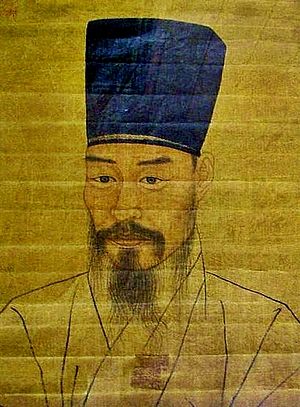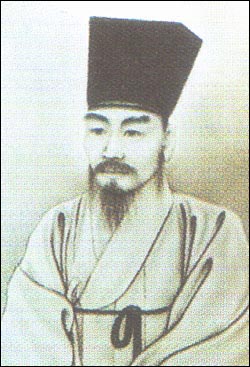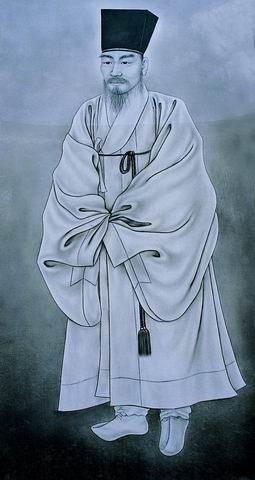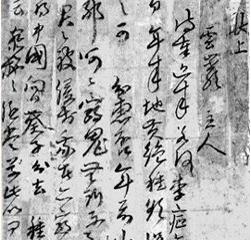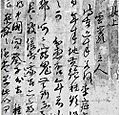Jo Gwang-jo facts for kids
| Jo Gwang-jo | |
| Hangul |
조광조
|
|---|---|
| Hanja | |
| Revised Romanization | Jo Gwangjo |
| McCune–Reischauer | Cho Kwangjo |
Quick facts for kids Art name |
|
| Hangul |
정암
|
| Hanja | |
| Revised Romanization | Jeongam |
| McCune–Reischauer | Chŏngam |
| Courtesy name | |
| Hangul |
효직
|
| Hanja |
孝直
|
| Revised Romanization | Hyojik |
| McCune–Reischauer | Hyojik |
| Posthumous name | |
| Hangul |
문정
|
| Hanja | |
| Revised Romanization | Munjeong |
| McCune–Reischauer | Munjŏng |
| Clan Origin | |
| Hangul |
한양
|
| Hanja | |
| Revised Romanization | Hanyang |
| McCune–Reischauer | Hanyang |
Jo Gwangjo (Korean: 조광조; Hanja: 趙光祖, born August 23, 1482 – died January 10, 1520), also known by his pen name Jeong-am, was a famous Neo-Confucian scholar in Korea. He tried to make big changes during the rule of Jungjong of Joseon in the early 1500s.
He was wrongly accused by powerful groups who didn't like his ideas. He was sentenced to drink poison during the Third Literati Purge of 1519. Many people in Korea later saw him as a hero for his beliefs and a great example of the "seonbi spirit." Some historians believe he was one of the most important people in 16th-century Korea. He is remembered as one of the 18 Sages of Korea and honored at Munmyo, a special shrine.
Contents
Jo Gwangjo's Early Life
Jo Gwangjo was the son of Jo Wongang and came from the Hanyang Jo clan. He studied under a Neo-Confucian scholar named Kim Gwoeng-pil. Kim Gwoeng-pil was in exile at the time because of the First Literati Purge of 1498. Later, Kim Gwoeng-pil was executed, and Jo Gwangjo was also exiled for being his student.
During this time, Joseon Dynasty politics had two main groups of nobles. One group was the "Hungu" elite, who were usually conservative. The other group was the "Sarim" scholars, who followed Neo-Confucian ideas. The Sarim group had started to get involved in court politics under King Seongjong. But they faced two harsh purges under the next king, Yeonsangun.
When Yeonsangun was removed from power in 1506, Jungjong became the eleventh king. The Hungu leaders who led the coup put him on the throne. For the first ten years, Jungjong couldn't truly rule on his own. But after the main coup leaders died, he started to bring Sarim scholars into his court. He wanted to balance the power of the Hungu group. The Sarim scholars thought the Hungu group was greedy and wanted to create an ideal Neo-Confucian society.
Jo Gwangjo came from a well-known Hungu family. But he was called "crazy" by some because he studied Neo-Confucianism with an exiled Sarim scholar. In 1510, Jo Gwangjo passed the Gwageo exam, which was a civil service test. He became a student at the Royal Academy, Seonggyungwan. He was often suggested for a court job, but he waited to study more. In 1515, King Jungjong appointed him to a junior position. Jo Gwangjo then took another exam, and his essay impressed Jungjong.
Jo quickly became known for being very honest and outspoken. He became a leader of the Sarim group. For example, when he got a low-level job in the Office of Censors, he immediately asked the king to fire all his bosses. He argued that they had stopped free speech. To everyone's surprise, Jungjong replaced almost everyone except Jo. This showed how much Jungjong trusted Jo, who quickly rose through the ranks in just three years.
Jo Gwangjo's Big Changes
King Jungjong wanted new, talented people in his court, which was mostly controlled by the Hungu group. Jo Gwangjo helped by creating a new way to find government officials. This system focused on a person's good character and knowledge. He felt the old exams focused too much on writing skills and not enough on what the government really needed.
The new exam Jo introduced was called an "examination for the learned and the virtuous." Local officials would recommend people with high integrity. The king would then choose the winners. This system helped Jo bring many talented Sarim scholars into the government. However, it also made the Hungu group accuse him of forming his own group of supporters.
Jo and his supporters then started many big reforms. They set up a local self-government system called Hyang'yak. This system helped local communities manage themselves and work together. It also meant that older villagers were respected more than those with higher social status. The Sarim group also wanted to reduce the gap between rich and poor. They suggested giving land equally to farmers and limiting how much land and how many slaves a person could own. This idea was aimed at the Hungu group, who had a lot of land and wealth.
Jo Gwangjo was greatly influenced by Zhu Xi's neo-Confucianism. He believed that an ideal society could be created if everyone, from the king to the common people, became morally good and followed Confucius's teachings. The Sarim group shared Confucian writings with everyone by translating them into Korean hangul. They also tried to stop Buddhism and Taoism, seeing them as superstitious. They even destroyed a royal Taoist temple and took property from Buddhist temples.
As Inspector General, Jo Gwangjo accused many officials of being corrupt. It was said that no official dared to take bribes or cheat people during this time because of his strict rules. He also tried to make the government smaller by reducing the number of officials and their pay.
Jo also believed that any talented person, even slaves, should be able to become an official, no matter their social status. He judged people by their character. He was polite even to his servants but would not greet higher officials if he thought they were not good people. For example, he became friends with a butcher, who was from the lowest class. Jo admired his learning so much that he discussed government matters with him. He even wanted to make him a court official. But the butcher refused and later disappeared.
Sarim Group's Power and Challenges
Jo Gwangjo's big changes were popular with the common people, who called him the "living Buddha." But he faced strong opposition from the Hungu group. In early 1519, some Hungu officials tried to harm Sarim officials, but they were caught.
Jo's power came from four main government offices. These included the Inspector General's Office, which checked corrupt officials, and the Office of Censors, which criticized wrong policies. These offices, along with Hongmoongwan, were called the Three Offices. They helped keep the king's and ministers' power in check.
However, the Sarim group did not control any army or have much money. Their power depended only on the king's support. Jo believed the king would always support their reforms. But Jo's strong will and constant requests to Jungjong started to annoy the king. Even when Jungjong disagreed with Jo, he often ended up doing what Jo asked. This was because Jo would not give up, and the Three Offices would threaten to resign. Also, Jo and other scholars often taught Jungjong about how a king should rule. Jungjong had not received a full royal education, and the Sarim scholars wanted to fix this. But Jungjong started to feel pressured by his subjects.
The Hungu group noticed Jungjong's annoyance with Jo Gwangjo. They saw a chance to attack the Sarim group when Jo decided to challenge the "heroes" of the 1506 coup that brought Jungjong to power. Jo argued that many officials who received special benefits from the coup did not actually help much. He asked Jungjong to take away these benefits from two-thirds of the 110 people who got them. This made the Hungu group very angry, and they soon planned to accuse Jo Gwangjo of disloyalty.
The "Jo Will Be King" Plot
Powerful Hungu leaders, like Hong Kyung-ju, Nam Gon, and Shim Jung, used the king's wives, Consort Gyeong and Consort Hui, to turn Jungjong against Jo Gwangjo. The consorts often questioned Jo's loyalty. They claimed that people were saying Jo Gwangjo was the real ruler and that the public wanted him to be king. They told Jungjong that even if Jo wasn't disloyal, he wouldn't be able to stop his supporters from making him king.
According to the Annals of the Joseon Dynasty, Nam Gon tried to make Jo look bad. He wrote the phrase "Ju cho will become the king" (주초위왕, 走肖爲王) on mulberry leaves using honey. Caterpillars then ate around the honey, leaving the phrase. When the two Chinese characters "ju" (走) and "cho" (肖) are put together, they form the character "jo" (趙), which was Jo Gwangjo's family name. Consort Hong or Consort Park showed the leaf to Jungjong. They said it was a warning from heaven that Jo would take the throne. Jungjong, who became king through a coup himself, started to distrust Jo Gwangjo.
When Jo asked Jungjong to take away special benefits from those who falsely helped in the 1506 coup, Jungjong's suspicions grew stronger. Feeling sure that Jungjong now disliked Jo, Hong Kyung-ju secretly met with the king. He warned Jungjong that the court was full of Jo's supporters and no one dared to oppose him openly. Jungjong sent a secret letter to Hong Kyung-ju. He expressed his fear that Jo Gwangjo would next question the legitimacy of the coup and then turn against the king. Jungjong told the Hungu leaders to kill Jo Gwangjo and then inform him.
On November 15, 1519, Hungu leaders secretly entered the palace at night. They presented written accusations against Jo to the king. They claimed Jo and his supporters "tricked the king and caused disorder by forming a group and using their positions to promote their friends while excluding opponents." Jo Gwangjo and several others were immediately arrested. They were almost killed without a trial. This event looked like a coup, but the king had approved it.
The Third Literati Purge of 1519
Jo Gwangjo was completely shocked by these events. Just four days earlier, the Sarim group had won a big victory when Jungjong agreed to take away special status from 70 Hungu officials. Jo still believed that Jungjong was being misled by his enemies. He was sure he could convince the king of his loyalty if he could just talk to him. He wrote to Jungjong, saying he would not regret dying if he could just have an audience. But he never saw Jungjong again. After many people asked for mercy, Jungjong changed Jo's death sentence to exile. Jo Gwangjo was sent away to Neung-ju.
However, Jungjong was determined to have Jo Gwangjo killed. The official records show no strong demand for Jo's death, not even from the Hungu leaders. Yet, Jungjong ordered Jo's death by poison less than a month after his exile. He fired many ministers who spoke up for Jo.
Jo Gwangjo still hoped the king would call him back. He kept a door open each day during his exile. Even when soldiers arrived with the poison, he thought the Hungu leaders might be trying to kill him without the king's approval. But when he learned that Nam Gon and Shim Jung got high positions, he finally realized that Jungjong's decision was final.
Later, when there was a severe drought, people blamed it on heaven punishing them for killing an innocent seonbi. Many Sarim scholars left the government in protest and went back to their homes in the countryside. Most of Jo's reforms were canceled after his fall.
The Third Literati Purge of 1519 (기묘사화 己卯士禍) is often seen as a lost chance to improve the Joseon Dynasty. After this, Joseon politics often became about power struggles among the royal family's relatives. A year after the purge, a historian wrote that bribery and corruption became common in the government. Later, the victims of the purge were honored as "Wise Men of Gimyo" (Gimyo is the Korean calendar name for 1519). The three main people who caused the purge were called the "Evil Three of Gimyo."
Hong Kyung-ju died two years later. But Shim Jung and Consort Kyung were later executed after being falsely accused in a plot by their rival. Nam Gon, who was reportedly sad about Jo's death, regretted his part in the purge. He asked for all his writings to be burned, saying he "tricked the world with a useless name." So, almost none of his writings remain, even though he was a famous writer.
Ten years after the purge, King Jungjong again started to bring Sarim scholars back into the royal court. However, Jungjong never fully cleared Jo Gwangjo's name, despite many requests. He once said that what happened in 1519 was "neither right nor wrong." Jo Gwangjo was finally honored by his son, Injong of Joseon. He was later given the title of chief state councillor by Seonjo of Joseon in 1568.
Jo Gwangjo's Legacy
Later generations of Korean Neo-Confucianists greatly admired Jo Gwangjo. They saw him as their spiritual leader. However, some also criticized him for mistakes that led to his reforms failing. Yi Hwang and Yi I, two of Joseon's greatest Confucian philosophers, said he entered politics too early and tried to make changes too quickly.
Still, Yi Hwang praised him as one of the "Four Wise of the East." He said Jo showed all seonbis the right path to follow and revealed how to govern a country. Jo Gwangjo believed that Neo-Confucian ethics should be a practical way of life. This idea was very important, as earlier Confucianism focused more on literary skills. It was also during his time that Confucianism truly became popular among common people. Even though Confucianism was the official state belief since Joseon began, its practices were mostly limited to the noble class. His dream of making Neo-Confucianism the main philosophy of Joseon came true about 50 years after his death. He was honored and placed in the Seonggyungwan in 1610. He was one of only eighteen Korean Confucian scholars to receive this honor.
Today, Jo Gwangjo's name is still a symbol of reform in Korea. His example is often mentioned when there are discussions about new changes.
Images for kids
See also
 In Spanish: Jo Gwangjo para niños
In Spanish: Jo Gwangjo para niños
- List of Korean philosophers
- Neo-Confucianism
- Nam Gon
- Kim Jong-jik
- Sim Jeong
 | Victor J. Glover |
 | Yvonne Cagle |
 | Jeanette Epps |
 | Bernard A. Harris Jr. |


